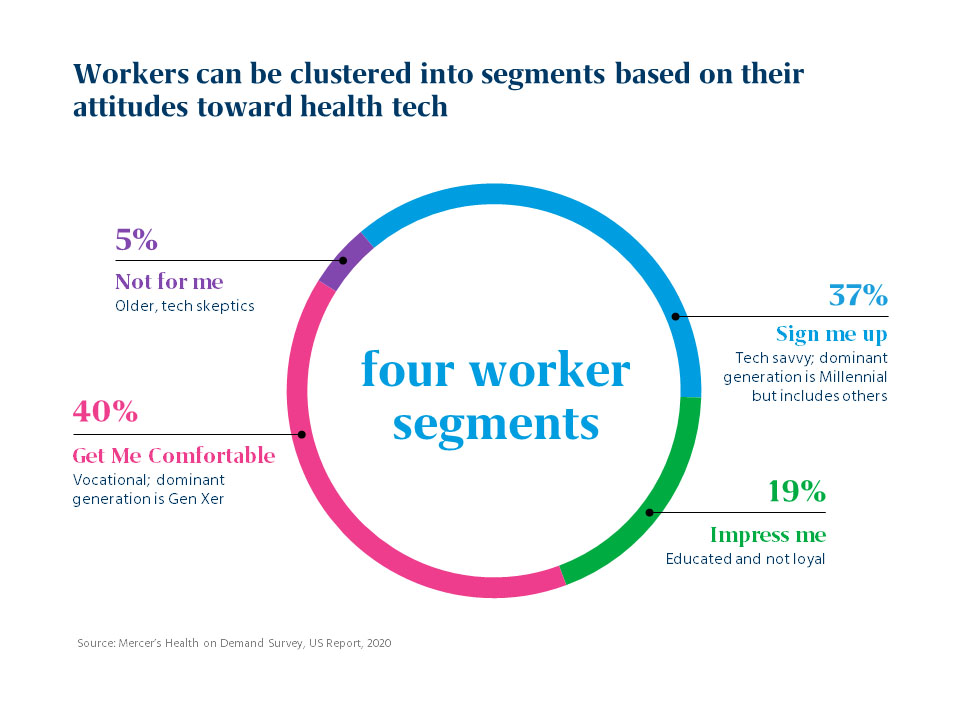Sign Me Up, or Not for Me? Workforce Digital Health Personas

Employers are on board with digital health solutions: According to our new Health on Demand research (a collaboration of Mercer Marsh Benefits, Mercer and Oliver Wyman), about two-thirds of US employers say they expect to invest more in digital health over the next five years. But what about employees? The study, which surveyed both workers and senior decision makers to compare and contrast their views on the future of health, found that US employees in general are not quite as ready for digital health as their employers. But a cluster analysis of the findings helped us to better understand differences in the perceived value of digital health innovations across the US workforce. We found that workers can be divided into four distinct segments, or personas, based upon their attitudes to health innovations, their confidence in digital health solutions sponsored by employers, and whether they would be more likely to stay with an employer offering these solutions.
 Sign Me Up workers make up more than a third of U.S. workers. About half are Millennials. They are tech-savvy and willing to try digital health innovations. They would have more confidence a digital health solution that is endorsed by their employer and would be more likely to stay with an employer offering digital health initiatives. Employers with a high concentration of Sign Me Up workers will find a receptive audience for new digital health tools, and the offerings will likely be repaid with greater loyalty.
Sign Me Up workers make up more than a third of U.S. workers. About half are Millennials. They are tech-savvy and willing to try digital health innovations. They would have more confidence a digital health solution that is endorsed by their employer and would be more likely to stay with an employer offering digital health initiatives. Employers with a high concentration of Sign Me Up workers will find a receptive audience for new digital health tools, and the offerings will likely be repaid with greater loyalty.
The Impress Me segment accounts for slightly less than one in five workers in the U.S. and nearly half are Millennials. They have high standards for digital offerings. While they are willing to try digital health innovations, access to digital health solutions at work is, nonetheless, unlikely to prevent workers in this segment from looking elsewhere for work.
Those in the Get Me Comfortable category make up four out of 10 U.S. workers. This segment is weighted toward Gen Xers and they are tech followers. They are receptive to trying digital health innovations, but don’t necessarily have more faith in solutions offered by their employer. Communication to this group may be most effective if it stresses the benefit of the digital solution and makes it clear why the employer has chosen to provide it.
Not for Me consists of older tech skeptics, weighted towards Gen Xers and Baby Boomers; they make up only 5% of the U.S. sample. This group is less receptive to trying digital health innovations, and less confident in employer-sponsored digital health solutions.
The take-away for employers? Different worker segments have different comfort levels with regard to digital health solutions, and so it’s important to introduce digital health in the context of a health-supportive culture that addresses a diversity of worker needs. Understanding the make-up of your workforce in terms of these four personas can help guide decisions about what digital health solutions to offer and how to communicate them. If your workforce mirrors the larger US workforce in terms of the four personas, a good approach may be to introduce more narrow solutions with immediate and clear benefits for workers before proposing initiatives featuring more provocative and futuristic features. When you’re evaluating new tech solutions look for those that incorporate principles of behavioral science to make the technology human. This matters because only technology that is sensitive to human thoughts, feelings and behaviors will become deeply integrated into your employees’ lives.
To learn more about the global Health on Demand survey download our reports: Global | United States
